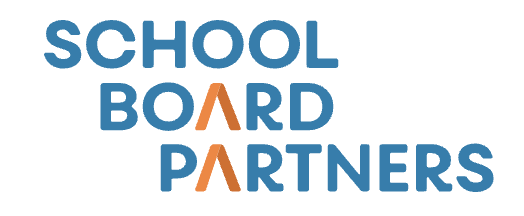Is Your School Board Prepared to Lead?
According to SBP, there has never been a more critical time to strengthen the leadership and governance of our nation’s public schools. This week, School Board Partners released a new school board governance framework and policy toolkit, Empowered Governance. Operating from the belief that school board members are often elected by their communities with a mandate for change, SBP believes governance frameworks must empower members to lead. However, existing governance models are few, antiquated, and do not empower members to step into their roles as policymakers. This is a problem because school board members who are not empowered, well-trained, and supported to govern can quickly become ineffective. Empowered Governance is a new, policy-centered governance model that offers a more accountable, power-balanced, and equity-focused approach to the work of school boards. By supporting sound policymaking and governance practices, this model empowers school boards to empower young people to reach their full potential, while also empowering historically marginalized communities.
These Are the Right-Wing Ideologues Taking Over School Boards
Today, School Board Partners released a first-of-its-kind Empowered Governance Framework and Policy Toolkit targeted to elected school board members. Thousands of new school board members were elected just last week and Empowered Governance will equip users with power, easily applied policies and tools for a more accountable, power-balanced, and equity-focused approach.
Get on Board: How 2 superintendents reach out to school board candidates
A mistake many districts and superintendents make—after the votes are counted—is not putting newly-elected board members through an onboarding process, say Ethan Ashley and Carrie Douglass, the co-CEOs and founders of School Board Partners, which offers training in anti-racist leadership and diversity. “That power dynamic plays an important role in how relations should be built,” says Ashley, a member of the Orleans Parish School Board in Louisiana. “It allows for a level-setting, and it’s about knowing that disagreement in itself is not what your relationships are built on. They’re built on mutual understanding of why the board members are in the role, the impact they’re trying to make and the legacy they want to leave.” Onboarding should cover concepts like mission statements or social contracts in which superintendents and board members set goals that will be aligned with the superintendent’s evaluation. These documents can also establish a roadmap for dealing with disagreements, adds Douglass, a former teacher and charter administrator who is now board chair at Bend-La Pine Schools in Oregon.
Opinion: Why School Boards Can and Must Be Leaders in Tackling Climate Change
When I first ran for school board in 2017, I was concerned about climate change personally but honestly didn’t understand what role I could play as a school board member. Once elected, I realized that our school district — like most school districts — is one of the largest landowners, real estate developers, transportation providers and employers in our community. This gives me — and school board members across the country — tremendous influence to lead positive change for climate action and climate justice.
School Board Openings Are an Opportunity for Equity
A recent report from School Board Partners found that just 38% of surveyed elected board members said that they intended to run for reelection. In recent years, some 70% of incumbent board members ran again, making such a decline something more than noteworthy. School boards hold tremendous power in public education. Responsible for setting the lion’s share of policy, practice and budgets in public schools, board members are often volunteers or earn just a negligible stipend. One consequence is those who serve tend to be wealthier and whiter than the student bodies over which they hold authority.
Want to Fight Racism? Start With Fixing School Boards | Opinion
Elected school boards need a complete transformation if we are going to provide our nation’s children with the education they deserve. That transformation must occur in three areas: people, power and professionalization. Our students need the right people on school boards who are representative of the community they serve. Those people need to use their power to dismantle systematic barriers for students. And that power will be enhanced by the professionalization of school boards, with rigorous training, tools, and support to effect change.
The Big Problem With Who runs for School Boards - And How to Fix
Carrie Douglass is the co-founder and co-CEO of School Board Partners, a nonprofit that supports and trains school board members across the country. She is a twice-elected school board member and past board chair. She has worked as a teacher, school leader, district administrator, and nonprofit leader.
How to Recruit and Retain School Board Members of Color
Three years ago, Jasmin Shaheed-Young formed an Indianapolis nonprofit called Rise Indy that was focused on promoting educational equity. She knew that having a school board that looked like the community would be important to her cause, but there was a lot of confusion in the community around what school board members’ roles in education are.
The 'Great Resignation' Hist School Boards, Only 38% of Members Want to Run for Reelection
“Long gone are the days when school board members held onto political power. Nearly three-fourths of board members don’t plan to run for reelection after their current term, new research shows. A ‘great resignation’ of school board members, including some who have made strides in furthering student equity, will leave hundreds of school board seats up for grabs in the coming years, according to nationally representative research by School Board Partners, a national nonprofit group that trains new school board members.”
Nearly Two-Thirds of School Board Members Set to Step Down, Survey Finds
Corrected: The initial headline for this article incorrectly reported the share of school board members who did not plan to run again. The correct amount is nearly two-thirds. As school board races become more politicized amid the national movement to curtail lessons on race, racism, and LGBTQ issues, only 38 percent of current board members said, in a new survey, that they plan to run for reelection.
Survey: Majority of School Board Members Will Not Run for Reelection
A report by School Board Partners also finds just 30% of current school board members are people of color, compared to 54% of public school students.A report by School Board Partners also finds just 30% of current school board members are people of color, compared to 54% of public school students.
Opinion: Earth Day is Over, But There's a Lot More Schools Can Do to Address Climate Change
Last month, schools across the country celebrated Earth Day, many bringing children and families together to clean parks and plant trees. That’s excellent, but it’s time to talk about the other 364 days of the year. We’re not minimizing what happened on that one day. Trees are desperately needed on our hot, blacktop-covered school playgrounds, and parks that welcome children and families matter deeply.












